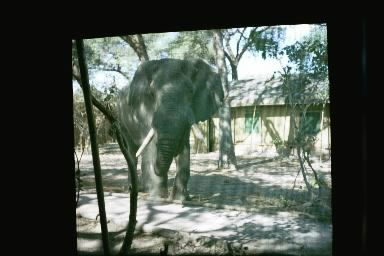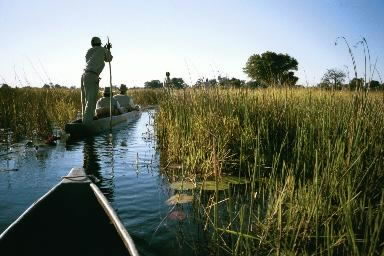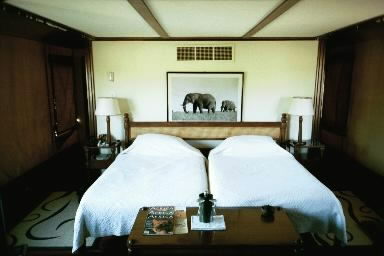UP CLOSE AND PERSONAL
IN BOTSWANA

"Please don't walk around alone at night," said Dennis Kampura.
"During the day you can see the elephants when they come into camp.
After dark a ranger always accompanies you to your tent."
The tents the camp manager referred to were were perched on a
high bank above the bone-dry Savute Channel in Botswana's Chobe
National Park. Partially enclosing them was a tall fence made of thin
wooden poles. Below the deck of the main lodge 3 bull elephants were
dipping their trunks in a small man-made water hole while two more
moved slowly through low-growing dusty shrubs toward the water.
Suddenly there was a noise behind us. A knobby head appeared
above the fence, glided past registration and the gift shop and
emerged in the parking lot. An enormous, heavily tusked African
elephant.
"That's the one that knocked me down yesterday," said Steve
Venter, the general manager of Savute Elephant Camp. "I was photo-
graphing and all of a sudden I saw this big head in the viewfinder.
Next thing I knew he brushed by me, gave me a nudge and over I went."
Of the 12 tents, I was in number 7, or would be when it came time
for bed. So, it seemed, was the elephant. Tiptoeing to the deck I
peeked around the corner and there he was, raising his trunk to the
roof. The tent shook as if it had been hit by an earthquake. An acacia
tree that sheltered the tent was hung with tasty pods and the elephant
was scooping them up. If enough pods didn't fall naturally, Steve
said, the elephant would give the tree a good shake. As a polite host
I let him stay, but I wasn't unhappy when he left.
To someone for whom tenting is synonymous with the Boy Scouts,
number 7 came as a bit of a shock. For starters it was air conditioned
during the heat of the day. In the much cooler evening while I was at dinner
someone snuck a hot water bottle between the sheets. The wooden deck
led to a very large bedroom furnished with sisal rugs, a handsome
writing desk and chairs of native woods. Two pristine double beds sat
under a soaring canvas ceiling. Behind the bedroom was a complete
modern bathroom with a walk-in shower. This was going to be tough.
After high tea (little sandwiches, cakes and coffee), Dennis
conducted 4 guests into the open seats of a rugged Toyota Land Cruiser
and we left camp on the afternoon game drive. Not far down the sandy
path a second Cruiser was parked by the side of the road, a sure sign
of something to see. From their perches, other Savute guests were
staring at a huge male lion stretched out in the brush not 20 feet
away. From the size of his tawny belly he appeared to have recently
eaten. From his total lethargy it was clear he wasn't going anywhere
soon.
So we drove on. In the waning light we saw zebras galloping
across a plain, warthogs trotting with antenna tails in the air and
herds of delicate impalas. We waited breathlessly while a powerful
lioness approached from far off and passed within inches without
giving us a thought. Two hours later when we came back the lion was
still there, still inert. Except that now he was flat on his back,
legs splayed in a very undignified manner.
Before supper I walked home to shower. On the far side of the
tent was my house guest. When he saw me he flapped his ears, gave a
snort and charged in a cloud of dust. He didn't mean it though. After
a couple of steps he stopped, having made his point. By then I was
safely inside, secure in the knowledge that I was protected from tons
of irritable pachyderm by a wall as thick as my thumbnail.
Savute Elephant Camp is one of three luxurious tented camps
operated by Gametrackers, the Botswana division of Orient-Express
Hotels. Through African Travel, Inc., a tour company that works
closely with Gametrackers, I'd arranged to spend two nights in each.
At one p.m. on the third day I climbed into a six passenger Cessna and
landed an hour later on the private air strip of Eagle Island Camp.
If Savute, planted deep in the desert of Chobe National Park, was
dry, Eagle Island was romantically, peacefully, wonderfully wet.
Shortly after I arrived, five other guests and I settled into four
mokoros, long, thin African canoes, and were poled into a placid
lagoon. "That's an African Jacana," said Tuelo, our guide, pointing at
a small brown bird hopping with delicate grace from lily pad to lily
pad. "We call it the Jesus bird because it walks on water."

Slowly and gently the mokoros left the lagoon and single filed
into a vast watery meadow. Acres of golden saw grass slid by. Strands
of water sage bobbed over our heads. Mounds of bamboo rustled paper-
dry like a natural sound machine. Each new bird was identified by
Tuelo: ebony reed cormorants sitting on a branch, white squacco herons
bursting from the grass, hippos grunting nearby. Hippos? "How close
are they," I asked, just a bit concerned. "30 meters, in a large
pool," Tuelo said. "It's too shallow for them here."
We and our mokoros were specks in a section of the great Okavango
Delta, the largest inland delta in the world. Its channels and islands
were created by earthquakes, Teulo explained, and constantly change.
"Four years ago there were four rivers. Now there are only three." The
water level, too, rises and falls from year to year and month to
month, depending on when the rains begin in Angola. What doesn't
evaporate finally disappears in the sands of the Kalahari Desert.
By now I was in awe of Tuelo's encyclopedic knowledge. A serious
but friendly man, he was a member of the predominant Bayei tribe and
had become interested in nature while at school. "When I graduated I
studied, studied, studied," he said. "When I passed the theoretical
and practical examinations I became a licensed guide."
So we were in good hands next morning when he whispered, "Now we
are downwind from them." We'd beached the mokoros on Hamerkop Island
and were walking through a field of "lovers' grass," so-called because
Bushmen once gave bouquets of it to their girlfriends. Grazing in the
distance was a small group of impalas, wildebeasts and tsessebes, dark
brown antelopes the size of ponies.
Suddenly the stillness was broken by a frantic choking sound.
"Come quick," Tuelo said. We followed and saw 100 feet ahead the hind-
quarters of a tsessebe thrashing wildly. The animal turned. Hanging
from it was a leopard, jaws fixed to its throat. The tsessebe fell,
its antlers motionless above the grass. We stepped forward and the
leopard, long and sleek, slipped like a ghost into the undergrowth.
Amazingly, during the few seconds of the attack, the other
tsessebes had moved toward their stricken companion instead of fleeing
the leopard. Now, ignoring us, they came even closer. The antlers of
the fallen animal moved. Shakily, but unwounded, it got to its feet,
gathered its strength, and together they galloped away.
"We saved its life," someone said, and we had. Tuelo didn't
reply. To the guide, even preventing an animal's death ran counter to
his belief in interfering as little as possible with the processes of
nature.
The contrast between Savute and Eagle Island Camp couldn't have
been greater, yet the experience of each was enriched by the other.
The third Gametrackers property promised to be a bit of both.
Kwai River Lodge was the oldest of the three camps but the most
recently refurbished, so everything looked brand new. The main lodge,
very large and very impressive, was open to the elements. The swimming
pool was heated to take off the chill. The tents, almost identical in
each camp, were so familiar it was like coming home. The African
Jacana, skittish at Eagle Island, paraded fearlesly on the lily pads
in front of my deck. As for game, when we landed on the airstrip a
herd of zebras, two giraffes and a group of red lechwes, marsh
antelopes, monitored our descent.

At Kwai River Lodge the tents sit on wooden platforms raised on
stilts. Mine was the last of 15, more isolated than the rest. Perhaps
that's why it was so attractive to wild beasts. One afternoon I returned
to find a warthog browsing under the porch, an animal that had won
the prize for ugly. And very early next morning I was awakened by the
sound of waves breaking on a beach. "How nice," I thought, half asleep.
Then I remembered there are no waves in the Okavango Delta.
Stepping onto the deck, my eyes slowly became accustomed to the
dark. Several feet away I made out three large hippos crashing through
the marsh. From one came a honk that rang across the lagoon. Another
answered with a low gutteral chuckle. "Got that tourist up," he said.
"Hello," someone whispered in my dream another morning. "Hello,"
again, very softly but insistantly until I realized it was my 6
o'clock wakeup call. For 8 hours I'd slept as if felled by an ax,
undisturbed by bellow, grunt or screech. By 6:30 I was standing in
front of the breakfast buffet. "Jungle oats?" the lady asked and
spooned out a bowl of oatmeal.
At 5 after 7, early on the morning game drive, Chendo Johnson
stopped the Land Cruiser. "Lion tracks," he said. "A big male."
Superimposed on the previous day's tire tracks were distinct, four-
toed prints. Slowly he followed them until they veered into the bush.
Johnson, as he preferred to be called, was a big strapping man
who had worked in the South African mines. Once, he told us, he'd come
upon a pride of lions. The excited guests jumped up and down,
prompting a lion to jump up, too, onto the hood of the Cruiser. For
several long moments Johnson and the lion engaged in a nose-to-nose
staring match which the guide ultimately won. When he looked back, all
six guests had disappeared under their seats.
Suddenly the radio crackled and Johnson sped off to join two
other Cruisers that had pulled into the bush. Toward us strode a sleek
spotted cheetah. Fighting to be still in spite of our excitement we
watched him pad silently by. Johnson turned on the engine and
followed. For almost an hour we tracked alongside the beautiful cat
through the undergrowth, stopping when he did to sit by a termite
mound, when he leaped onto a fallen tree to survey his surroundings
and when he marked his territory with a spray of urine. At last he
walked into the forest and was gone.
Still riding our high, we were driving away when again Johnson
stopped. Somehow he'd seen, though it was exactly the same color as
the grass, the mane of a male lion. Slowly he inched the Cruiser off
the road. When we were ten feet away the lion raised his magnificent
head, glanced at us indifferently, and flopped over with a thump.
By 9 o'clock I'd seen most of the animals I'd already collected
so far on my trip, but in larger numbers and closer. In the early morn-
ing sun the impalas were more golden, the giraffes more tawny and the
white stripes of the zebras phosphorescent. At 9:30 Johnson paused to
give his four passengers a snack. This would hold us 'til brunch at 11
which would hold us 'til high tea at 3:30 et cetera 'til "sundowners"
at 6, et cetera 'til dinner at 8. No one went hungry at Gametrackers.
After dinner we were surprised by the sound of singing. Out of
the kitchen came the staff, a choir now, presenting us with a concert
of folk songs. And they were good! Chefs and waiters and bottle
washers, their voices rang out mightily while we clapped and urged
them on.
"Kwai River is the hardest camp to leave," someone said on the
last day. "because after this we have to go home." I felt the same,
though it would have been true at whichever camp was last. Several
times I had to shake myself to remember where I was. It was hard to
believe that the comfort and cuisine of fine hotels could be found in
remote desert and delta camps. Or that so much variety could be packed
into a single week.
But this was Botswana, the possible Africa. The Africa that's not
in the news. When good things are reported it will be.
HOW TO GET THERE: South African Airways, 800 722-9675, flies non-stop
to South Africa, from New York to Johannesburg (about 14 hours) and
Atlanta to Cape Town. Their non-stop return is from Johannesburg to
Fort Lauderdale. One stop to the other cities. Delta Airlines, 800 241-
4141, is SAA's partner and flies the same routes. From Johannesburg,
fly Air Botswana to Maun where Gametrackers will meet you and fly you
to your first camp. Transfers between camps are with light aircraft,
arranged by Gametrackers.
AFRICAN TRAVEL, INC. can arrange a complete Gametrackers package from
departure to return. It's the best way to make a complicated itinerary
carefree. Call 800 421-8907 Web site: www.africantravelinc.com.
WHEN TO GO: Botswana's seasons are the opposite of ours. Starting in
May, winter brings clear, sunny and often hot days, with night tempera-
tures dropping sharply. Game viewing is best from the May to September
dry season when game moves from the dry interior to the waterways of
the Okavango Delta, Moremi Game Reserve and Chobe National Park.
WHAT TO TAKE: Binoculars, flashlight, sunglasses, sun screen, lots of
film, extra batteries. Clothing: "casual-elegant" for hotels, casual
for game camps. It is very important to bring warm clothing for morn-
ing and evening game drives. During the day I wore convertible pants
from Ex Officio, 800 644-7303. When it gets warm, the legs zip off.
USEFUL INFO: Credit cards are accepted by Gametrackers properties and
give better exchange rates than travelers checks. Tap water is safe to
drink. The game camps offer complimentary laundry service. "Africa's
Top Wildlife Countries" and "African Safari Journal," by Mark Nolting
are excellent safari resources. Web site: www.Africa-adventure.com.
EXTENSIONS IN SOUTH AFRICA, ACCOMMODATIONS AND DINING:
In Johannesburg, the Westcliff Hotel is one of the best anywhere. After
a long flight or a safari vacation, the Westcliff is highly recommended
for a day or two of unwinding. The Mount Nelson Hotel in Cape Town
is a South African experience that shouldn't be missed. For both, call
Leading Hotels of the World, 800 223-6800. Website: www.lhw.com. On
the Cape Peninsula the Cellars-Hohenort is a perfect getaway. In the
Winelands, La Grande Roche can't be surpassed. For both, call Relais &
Chateaux, 800 735-2478. Website: www.relaischateaux.com. The
restaurants of the above hotels are among the best in South Africa.
RENTALS: Avis Car Rental offers many unique features in South Africa:
Temporary Automobile Association membership, complimentary cell phones
and "Younique Options," an extremely valuable personalized driving and
itinerary guide. Call 800 331-1212.



